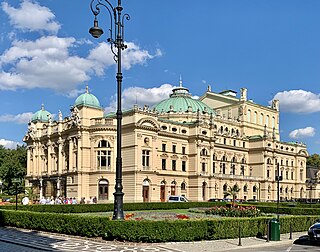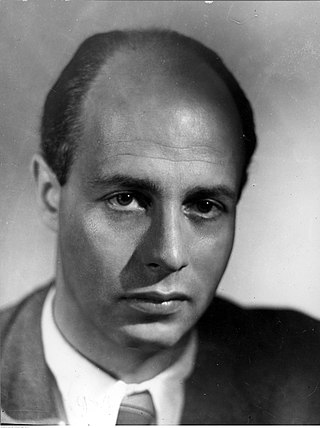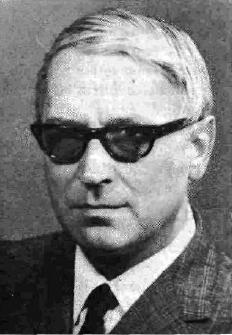In common with other European countries, the most frequent and most popular form of theatre in Poland is dramatic theatre, based on the existence of stable artistic companies. It is above all a theatre of directors, who decide on the form of its productions and the appearance of individual scenes. There is no strict division in Poland between theatre and film directors and actors, therefore many stage artists are known to theatre goers from films of Andrzej Wajda, for example: Wojciech Pszoniak, Daniel Olbrychski, Krystyna Janda, Jerzy Radziwiłowicz, and from films of Krzysztof Kieślowski, actors such as Jerzy Stuhr, Janusz Gajos and others.

Verse drama is any drama written significantly in verse to be performed by an actor before an audience. Although verse drama does not need to be primarily in verse to be considered verse drama, significant portions of the play should be in verse to qualify.

Sławomir Mrożek was a Polish dramatist, writer and cartoonist.
Marie Clements is a Canadian Métis playwright, performer, director, producer and screenwriter. She was the founding artistic director of Urban Ink Productions, and is currently co-artistic director of Red Diva Projects, and director of her new film company Working Pajama Lab Entertainment. Clements lives on Galiano Island, British Columbia. As a writer she has worked in a variety of media including theatre, performance, film, multi-media, radio and television.

The architectural form of theatre in Rome has been linked to later, more well-known examples from the 1st century BC to the 3rd Century AD. The theatre of ancient Rome referred to as a period of time in which theatrical practice and performance took place in Rome has been linked back even further to the 4th century BC, following the state’s transition from monarchy to republic. Theatre during this era is generally separated into genres of tragedy and comedy, which are represented by a particular style of architecture and stage play, and conveyed to an audience purely as a form of entertainment and control. When it came to the audience, Romans favored entertainment and performance over tragedy and drama, displaying a more modern form of theatre that is still used in contemporary times.


Erwin Axer was a Polish theatre director, writer and university professor. A long-time head of Teatr Współczesny in Warsaw, he also staged numerous plays abroad, notably in German-speaking countries, in the US and Leningrad (USSR). Laureate of Witkacy Prize – Critics' Circle Award (1993).
Anna Gutto, or Anna Guttormsgaard is a Norwegian director, writer and artistic director living in Los Angeles and Oslo. Her career includes acting, writing, translating, directing and adaptations into English from Norwegian texts.

AST National Academy of Theatre Arts, is a drama school based in Kraków and Wrocław, Poland. It was founded in 1946 by actor Juliusz Osterwa, who took the initial steps leading to the establishment of the Academy through the amalgamation of three local studios; Stary Teatr, the Słowacki Theatre, and Iwo Gall's Dramatic Studio.
Samuel French, Inc. is an American company, founded by Samuel French and Thomas Hailes Lacy, who formed a partnership to combine their existing interests in London and New York City. It publishes plays, represents authors, and sells scripts from its Los Angeles, UK, and online bookstores.

Kunio Kishida was a Japanese playwright, dramatist, novelist, lecturer, acting coach, theatre critic, translator, and proponent of Shingeki. Kishida spearheaded the modernization of Japanese dramaturgy and transformed Japanese theatre acting. He was a staunch advocate for the theatre to operate as a dual artistic and literary space.

Theater J is a professional theater company located in Washington, DC, founded to present works that "celebrate the distinctive urban voice and social vision that are part of the Jewish cultural legacy".
Elliott Hayes was an aspiring Canadian playwright when he was killed in a car accident by a drunk driver.

Jože Javoršek was the pen name of Jože Brejc, a Slovenian playwright, writer, poet, translator and essayist. He is regarded as one of the greatest masters of style and language among Slovene authors. A complex thinker and controversial personality, Javoršek is frequently considered, together with the writer Vitomil Zupan, as the paradigmatic example of the World War II and postwar generation of Slovene intellectuals.
Armenian theater dates to before Roman times and is one of the oldest Eurasian theatrical traditions.
Hindi theatre is theatre performed in the Hindi language, including dialects such as Braj Bhasha, Khari Boli and Hindustani. Hindi theatre is produced mainly in North India, and some parts of West India and Central India, which include Mumbai and Bhopal. Hindi theatre has its roots in the traditional folk theatre of North India, like Ram lila and Raslila, and also influenced by distant Sanskrit drama. Starting with Bhartendu Harishchandra in the late 19th century and subsequent playwrights like Jaishankar Prasad, Mohan Rakesh, Hindi theatre came of age in the 1940s and 50s, when IPTA movement created a new brand of theatre practitioners in Hindi speaking areas, especially with IPTA Mumbai, Prithvi Theatres of thespian Prithviraj Kapoor, and theatre artiste Habib Tanvir, paving way for next generation of artists who came out once National School of Drama, Delhi started functioning in 1959.
Tango is a drama written by Polish writer, dramatist and cartoonist Sławomir Mrożek (1930–2013). It was first published in the literary magazine Dialog (Dialogue) in 1964. In Poland, Tango was staged for the first time in Bydgoszcz in 1965. The drama has been translated into English, Italian, Japanese, French, Danish, Hebrew, Czech, Greek, Slovenian, Dutch, Estonian, German, Spanish and other languages.

Reza Shirmarz, is a Greece-based, published, and awarded playwright, translator, researcher, theatre director and essayist with more than 40 books both written and translated by him, who has been collaborating with major publishing companies, theaters, drama schools, radio channels, journals, etc. in Iran. Reza Shirmarz was elected as a member of the board of directors of Iran's Playwrights Guild for 3 ongoing years. He has also been a professional member of bodies such as Iran's Playwrights Guild, PEN America, and Dramatists Guild of America. He also is a language specialist and a full member of Chartered Institute of Linguists (CIOL) in London.

Theatre in Croatia refers to the history of the performing arts in Croatia, or theatrical performances written, acted and produced by Croatians. Croatian theatre generally falls into the Western theatre tradition, with influences especially from Italy, Germany, Austria and other European nations.

Konrad Ksawery Swinarski – Polish theatrical, television, film and opera director and stage designer.











